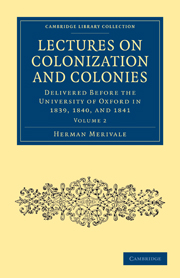 Lectures on Colonization and Colonies
Lectures on Colonization and Colonies Summary
We have now examined together the principal theories which have been promulgated respecting the disposal of waste land in colonies, and have endeavoured to follow them out into their economical consequences. I propose to conclude this part of my inquiries with a very brief investigation (as it necessarily must be) of the facts which experience furnishes respecting it; confining myself to those chapters of history which are the most instructive and important to us: namely, the recent annals of our North American colonies, the United States, and Australia. These will present to us, in succession, the results of the system of free grant, the system of sale at low prices, and the system of sale at high prices.
“In the North American colonies, as in the United “States,” Lord Durham has said, “the function of “authority most full of good or evil consequences has “been the disposal of public land.” The phrase may be exaggerated; but of its great importance, in all colonies, no doubt can be entertained.
But, as we are now considering the case of old colonies, I must revert to a question touched upon in an earlier portion of these lectures. If this function be of so great importance, and if it be one strictly domestic in its character, and requiring, above most others, that practical knowledge which is best attained on the spot, why is it not confided to the colonial governments, especially to the colonial legislatures, where these exist?
- Type
- Chapter
- Information
- Lectures on Colonization and ColoniesDelivered before the University of Oxford in 1839, 1840, and 1841, pp. 90 - 109Publisher: Cambridge University PressPrint publication year: 2010First published in: 1842
